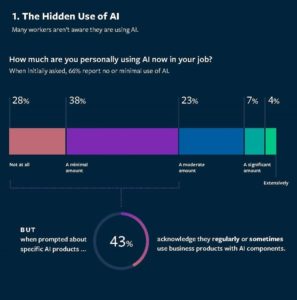
Report: 60% of Employees Using AI Regard It as a Coworker, Not a Job Threat
BOSTON, Nov. 1, 2022 — Despite the popular belief that organizations derive value from artificial intelligence (AI) at the expense of the individuals they employ, and that AI-powered automation can lead to the displacement of workers, 60% of employees view AI as a coworker and not a job threat. Furthermore, organizations with employees who derive value from AI are 5.9 times as likely to see significant financial benefits from it than organizations where employees do not get value from AI, according to a report from MIT Sloan Management Review (MIT SMR) and Boston Consulting Group (BCG) being released today.
The report, “Achieving Individual — and Organizational — Value With AI,” presents findings from the sixth annual research effort between MIT SMR and BCG on AI and business strategy. It includes results from a global survey of 1,741 managers and interviews with 17 executives representing more than 100 countries and 20 industries on the use of AI at work. According to the report, individuals derive personal value from AI when using the technology improves their self-determination, which encompasses their competency, autonomy, and relatedness.
“AI use in business is now pervasive. Many technologies have embedded, even hidden, AI components that workers may not even be aware of. When everyone is using AI to some degree — and getting value from it — familiar tropes become problematic,” said Sam Ransbotham, professor of analytics at Boston College and guest editor for the MIT SMR Artificial Intelligence and Business Strategy Big Ideas research initiative. “For example, the idea that managers who use AI will replace managers who don’t use AI loses meaning when everyone is using AI.”
Understanding the Extent of AI at Work
AI use is so pervasive that individual workers may take some of its applications for granted. According to the findings, 66% of individuals report that they do not use AI or use it only minimally. But when prompted with specific examples of AI-enhanced business applications, such as office productivity applications, calendar schedulers, and customer relationship management software, 43% of these respondents acknowledge that they regularly or sometimes use business products with AI. (See Figure 1.)
“When individuals don’t know that they are using AI, they naturally have a harder time recognizing its value,” said François Candelon, global director of the BCG Henderson Institute and coauthor of the report. “But our research shows that employees using AI knowingly are 1.6 times more likely to get individual value and 1.8 times more likely to be satisfied with their jobs than those who do not realize they use AI.”
Mandating the Use of AI Is a Critical Step to Overcoming Resistance
Interviewees and survey respondents indicate that mandating the use of AI is an important initial step to overcoming resistance. Making AI use mandatory triples the likelihood of its use: Individuals required to use AI at work are three times as likely to regularly use the technology as those not required to use it professionally. But managers should still ensure that individuals have agency. Individuals who can override AI are 2.1 times as likely to use it regularly compared with those who cannot override it. Moreover, managers who lead by example by using AI with their teams are 3.4 times as likely to boost regular AI use among individual team members than managers who do not.
“Trust is just one factor driving AI adoption: Being required to use it. Seeing your boss use it. Having the ability to override it. These all contribute to adoption, especially at the early stages of AI deployments,” noted David Kiron, MIT SMR editorial director, research, and coauthor of the report.
AI’s Impact on Job Satisfaction, Competency, and Coworker Interaction
According to the report, 64% percent of survey respondents personally derive at least moderate value from using AI. These workers are 3.4 times as likely to be more satisfied in their jobs than employees who do not obtain value from AI. Only 8% of global survey respondents are less satisfied with their jobs because of AI.
Individuals who receive AI-based suggestions on improving their performance are 1.8 times as likely to feel more competent in their roles than those who don’t. Furthermore, employees working at organizations that invest in AI that improves the quality of decision-making for matters such as operations scheduling, inventory management, and marketing ROI are 1.5 times as likely to perceive individual value from AI compared with those who are in organizations that do not invest in this type of AI.
The survey revealed that many respondents think that using AI has improved interactions with their team members (56%), with their managers (47%), and with other people in their departments (52%), in addition to helping them feel more capable in their job performance.
“To obtain the financial and organizational benefits of AI, managers must promote a virtuous cycle of use and value at the individual level by cultivating trust, understanding, agency, and awareness of the technology,” said Shervin Khodabandeh, a senior partner and managing director at BCG, coleader of GAMMA in North America, and a coauthor of the report. “The relationship between individual and organizational value from AI is additive, not zero-sum.”
Source: BCG




























